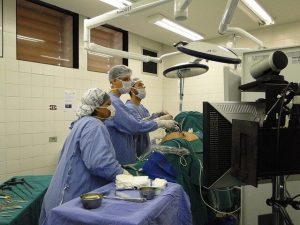The organs found in our body each plays a vital role in our life. However, people do abusive things which result in a failure of these organs. One of these organs is the kidney. There are at least two ways to treat your kidney once it fails – a dialysis or transplant. A lot of people prefer a kidney transplant since it gives them a better life quality, unlike dialysis.
In a kidney transplant, your old kidney will be replaced with a healthy one to do its job. It is better to talk to a patient who had a kidney transplant if you are planning to have one. You should also take to your doctor about it. But how much does kidney transplant cost?
Kidney Transplant

The basic definition of a kidney transplant is replacing the old, unhealthy kidney with a new and healthy one. The kidney that will replace should match the old kidney.
There are only little restrictions on what you can drink or eat whenever you have a kidney transplant, however, professional’s advice that you should follow a much healthier diet. You should expect an improvement in your energy and health after a kidney transplant. You might live again your life before you had a kidney failure if the kidney transplant is very successful. People who remain in dialysis live a shorter life than people who had kidney transplants according to a study.
On the other hand, there are also risks in a kidney transplant. You are also required to take anti-rejection drugs. These drugs will prevent your immune system to reject your new organ. You will have to take this for as long as you have a new kidney.
The life-span of a person who had a kidney transplant differs from one person to another. There are a lot of people who are required to have more than 1 kidney transplant in their lifetime.
Women who have undergone a kidney transplant is required to avoid pregnancy after the transplant. Professionals recommend women to wait at least 1 year before she gets pregnant and it should be planned as well. Anti-rejection drugs should be stopped six weeks before the women plan to get pregnant because these drugs can harm the baby.
Kidney Transplant Cost
It is best to consider the accompanying cost whenever you are making an allowance for a kidney transplant.
A kidney transplant is usually covered by an insurance since it is a medical necessity. The cost of a kidney transplant if you are covered by an insurance only consist of out of pocket costs such as copays for the doctor’s visit, prescription drugs, and lab. A 10% up to 50% coinsurance for the surgery and additional procedures is also included.
On the other hand, according to UNOS (United Network for Organ Sharing), patients who are not covered by insurance will have to spend more than $262,000 for the first-year bills.
You will need few extra medications after your surgery. These medications are called immunosuppressive. These will help your body tolerate the new kidney.
Brands like Cellcept, Prograf, and Prednisone are the well-known anti-rejection medications. Total monthly cost for Cellcept is estimated to be around $1,064. While the monthly cost for Prograf is estimated to be around $1,340. And the total monthly cost for Prednisone is estimated to be around $12. The following given estimates vary on the required dosage and the pharmacy.
Transplant testing and evaluation, surgery, follow-up medication and care should always be included in the cost of the transplant.
You will possibly have a lot of medical bills for treatment from your hospital, physician, medical specialists, and laboratories even before the actual transplant. And these costs can quickly add up to the total.
The time spent in the ICU or Intensive Care unit is the biggest factor that affects the cost. This also greatly depends on your condition. There are few patients that are treated in the ICU even before the transplant and it depends on their condition. While generally, all patients that have undergone the surgery will be taken to the ICU immediately after the operation.
You can able to pay all the costs for the transplant even from a single source. A good example for this is a health insurance. Health insurances may cover the cost of the transplant procedure. While other expenses can be paid using your savings account or even selling some of your properties. These sources are much reliable when you combine them.
Additional Cost
As what we’ve mentioned above, you will also have to consider all the additional expenses you have to spend after the surgery. These expenses will add up to the total cost of a kidney transplant.
You will need to take anti-rejection drugs as long as your new kidney is working. The cost of these drugs can go up to $17,000 per year, as stated by the American Kidney Fund.
Additional charges accompanying with transplantation consist of:
- Extensive laboratory tests
- Recovery of the organ
- Stay and recovery in the hospital
- Fees for the surgeons and other operation personnel
- Anesthesia
- Rehabilitation and Physical therapy
- And lastly, anti-rejection drugs.
Ways to Save Money
You, your family, and your friends can do a fundraising campaign to help cover the extra expenses such as food and lodging. Fundraising campaign can even cover the cost of the procedure. However, you should be careful since you will have to consider financial and legal concerns.
Patients around any age are qualified for Medicare if they have kidney failure and are required to take dialysis. Medicare, however, only covers anti-rejection drugs for 36 months. Data about Medicare and other monetary funds can be found on The National Kidney and Urologic Diseases Information Clearinghouse.
Inclusions
Now that you know how much does kidney transplant cost, the next thing you should also know is its inclusions.
You can minimize the risk of any complications if you follow a healthy lifestyle after your kidney transplant. This healthy lifestyle should include:
- Stop or quit smoking
- Follow and eat a much healthier diet
- Exercise daily
- Follow steps that reduce any infections
Following a healthy lifestyle can also increase the lifespan of your transplanted kidney. However, there are also other factors to consider such as the origin of the kidney. The average survival times of a kidney are:
- 95% lasts 1 year
- 85% up to 90% lasts 5 years
- Below 75% lasts 10 years
You will be placed under a general anesthetic during the operation. The doctor will immediately make a cut in your abdomen after the anesthesia takes its effect. The doctor will then take the kidney of the donor and sews the tube (also known as ureter) that brings out the urine from the kidney to the bladder.
Kidney Donors
The kidney that you will use might come from a person who recently died and signed up for organ donation. They are called Deceased Donor.

There are also kidneys that are coming from a living donor. Sometimes, these donors are your relatives such as your brother or your sister. Non-relatives such as your husband and wife can also be a kidney donor. There are also times where your friend will be the donor.
The surgery will be done the same day as the donor donates the kidney if you use a living donor. It can be scheduled at a time which will be convenient for both of you. Living donors should not worry about their health since they can still live an ordinary life even if they only have 1 kidney left. However, the risk of the operation is shared with you and the donor.
There is also a disadvantage of living donation. The living donor should also undergo a surgery to remove his or her healthy kidney. Because of this, the donor will also need a recovery time before he or she can return to work or any other activities. Fortunately, there is a surgery called laparoscopic surgery which only requires very tiny cuts. Because of this, the donor will have shorter hospital stays and shorter recovery time. The living donor will also experience less pain after the surgery.
A kidney coming from deceased works the same as a kidney coming from a living donor. However, it is much better to have a kidney from a living donor since it lasts longer than kidneys coming from a deceased donor.
You will have to get a kidney from a deceased donor if there are no available kidney from a living donor that is compatible with you. You will be placed on the list of waiting for patients to get a kidney from a deceased donor. You might have to wait for years before you can find a good kidney. You will have to be on dialysis while waiting for the right kidney for you. You will also be required to take regular blood tests to ensure that you are ready for the transplant while waiting. The surgery should be done as soon as there is a kidney available.
